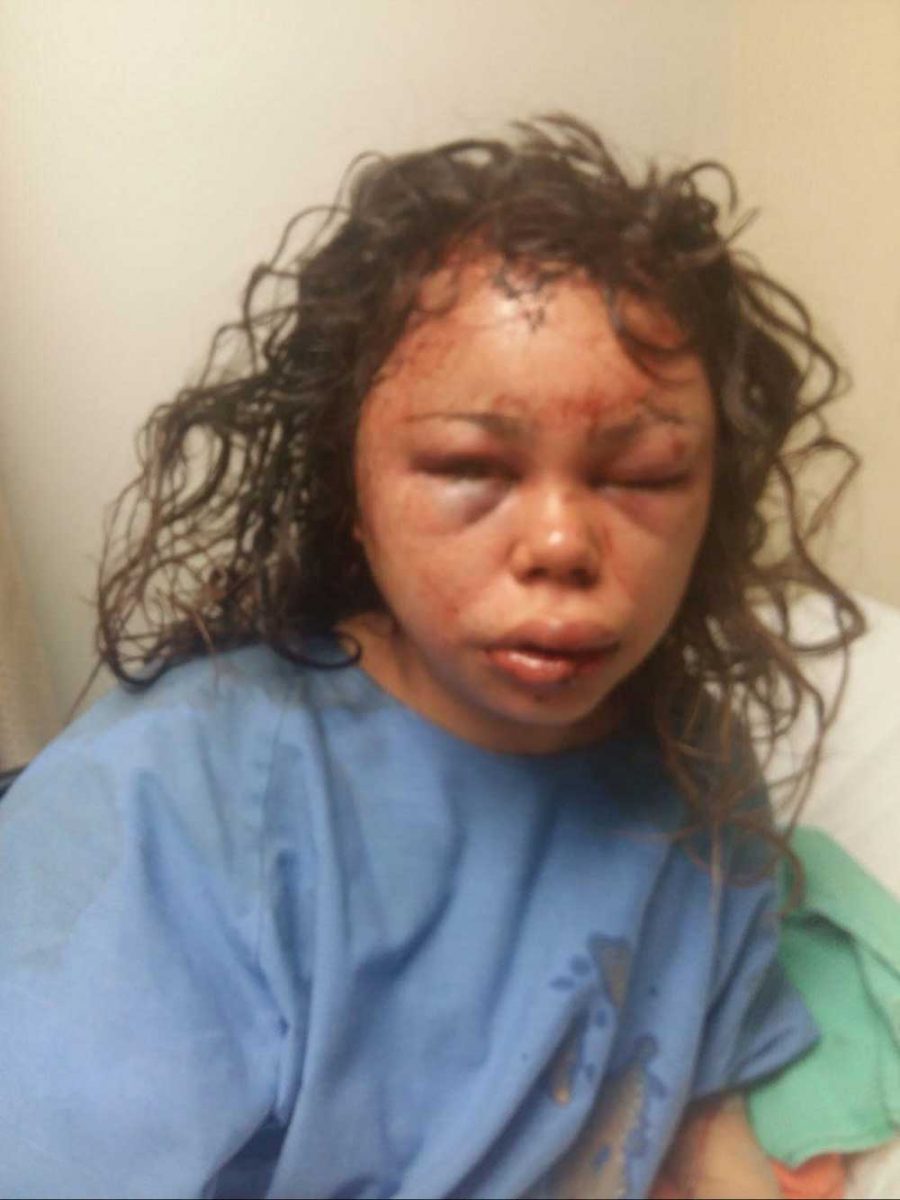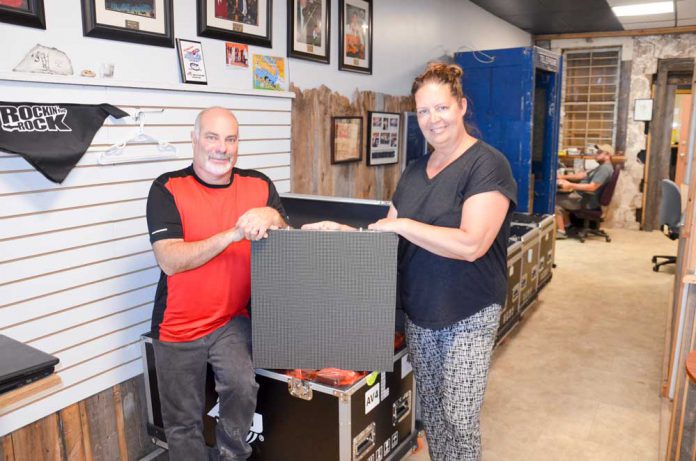EDITOR’S WARNING: A graphic photo of the survivor after she was viciously assaulted will be seen on this story
GORE BAY––Brooke Williams-Manitowabi of Wiikwemkoong almost became a statistic. On the night of April 2, 2016, the then 18-year-old woman was viciously beaten and sexually assaulted by someone she didn’t know as she walked home. Nearly two-and-a-half years later, she was able to find closure and truly begin the healing process as her assaulter, Bradley Jacko of Wiikwemkoong, was sentenced on Monday, July 9.
Mr. Jacko, now 25, was charged with seven offences and pleaded guilty to all charges except aggravated sexual assault. He was found guilty in a trial by judge; sentencing was for the sexual assault charge.
Ms. Williams-Manitowabi requested the publication ban be lifted so she could share her story.
On the night of April 2, Ms. Williams-Manitowabi left a residence to walk home. Mr. Jacobs left at the same time and walked in the same direction. When Ms. Williams-Manitowabi stopped at another residence, Mr. Jacko lingered. When she left that residence and approached the entrance of the trail that would take her home to her mother and one-year-old daughter, he attacked.
Her survival instinct kicked in and several times she ran for her life. She headed for the youth centre, where she knew there was a surveillance camera. In spite of her efforts, Mr. Jacko persevered and brutally assaulted her. Evidence showed bruising all over her body. She received stitches in three places on her scalp as well as on her eyebrow and inside her lip. Her back and buttocks were scraped and her knees were raw down to the bone from being dragged. She dug her fingernails into the ground in an attempt to stop the dragging. A finger on her right hand is held together by pins now. Her ankles were swollen from Mr. Jacko’s grip as he dragged her into the bush; one ankle was severely sprained. He used a stick to beat her; her face was so swollen she could not open her eyes.

Angel Manitowabi, Ms. Williams-Manitowabi’s mother, received a phone call that no mother wants. “It’s been a nightmare,” she said. “I think it’s any parent’s worst nightmare to get that phone call and see your daughter on the (hospital) bed like that. I was with her every day at the hospital. I suffered with her from day one.”
The process post-assault revictimized her daughter, said Ms. Manitowabi, explaining, “Throughout this process the hardest part was the way she was treated in the hospital. We had to go to Sudbury at 3:30 in the morning for the rape kit.” There was no transportation available at that time. “I had to carry her into my car. By the time we got there, the pain medications had worn off and she just wanted to get back.” Pain medication couldn’t be offered in Sudbury because of the required testing. There is a 72-hour window in which to complete that process, so time was a concern. “There should be kits in our hospital,” she said.
(EDITOR’S NOTE: Earlier this year The Expositor reported that Noojmowin Teg Health Centre had received funding from the Ministry of the Attorney General’s Indigenous Justice Division to develop sexual assault services, including forensic testing, for victims of sexual assault and domestic violence on Manitoulin. A project status update was not available at press time).
Before the drive to Sudbury, Ms. Williams-Manitowabi received stitches for her head and facial wounds. “No pain medication was given,” said Angel Manitowabi. “She suffered with that pain on five different spots.”
Mr. Jacko wasn’t arrested for several days following the assault. “Our locks had to be changed,” said Ms. Manitowabi. “We didn’t know this man. We didn’t know if he would carry through on his threats. She was terrified he was going to come there.”
Ms. Williams-Manitowabi attended physiotherapy for her ankle but still experiences pain and cannot run. Writing is difficult because of the damaged finger. On the surface, Ms. Williams-Manitowabi looks almost normal. While physical recovery has been difficult, emotional and mental recovery has been a nearly insurmountable challenge.
“When he pled not guilty, she was asking if nobody believed her,” said Ms. Manitowabi of her daughter. “She kept saying, ‘It happened to me, what happened to me is real.’ She kept repeating it, to the nurse, the doctor and then to the police. She cried a lot, isolated herself. Sometimes just to touch her she would jump. She was so angry at everybody. She wanted that help at the beginning. She really did. Maybe things would have turned out different if the help was there.”
Her mother reached out to Wiikwemkoong Grandmothers Donna Pangowish and Alison Recollet for assistance. “I didn’t know where to go,” she explained, “or who to talk to. Before that we tried to go to local counselling and were told there was a nine week waiting period to be seen, nine weeks in that crisis we were in. I couldn’t believe it.”
They found counselling in Sudbury; however, that meant two hours travel each way. Ms. Manitowabi was missing work to drive her daughter to appointments. “She missed two sessions in Sudbury because I had made other arrangements for her travel as I had used up all my time. Brooke didn’t make those appointments. When she was ready to go back, she had to pay for those missed sessions at $100 per session.”
Ms. Williams-Manitowabi’s daughter was just over one-year-old when the assault happened. “Brooke was such a loving, caring, nurturing mother (before the assault),” said her mother. “What made her move out of my place was her screaming in her sleep, her nightmares. She shared a room with her daughter. She woke the baby up with her screaming, so she didn’t want to be there anymore. She was angry with the feelings, the dreams, the nightmares.”
Ms. Williams-Manitowabi moved in with her father. It was then that she began drinking and self-medicating. “I watched the system fail my daughter on so many different levels,” said Ms. Manitowabi. “It shouldn’t have been that way when she needed the support. She didn’t ask for these things to happen. She didn’t consent to any of it.”
Ms. Williams-Manitowabi had to put high school on hold. By the time she could return she had aged out of the system. Many of her friends had already graduated and were continuing their post-secondary journey. She had enjoyed her studies and dreamt of becoming a doctor but was unable to follow through.
Family members travelled from Sudbury and Toronto to offer support at every single court date. They were present at sentencing. An uncle sat with Ms. Williams-Manitowabi in a private room where they observed proceedings on closed circuit television. An auntie read her victim impact statement to the court as she was too afraid to be in the same room as the defendant.
“You don’t know me,” she wrote in her statement, addressing Mr. Jacko. “But you’ve violated me, intentionally, forcibly, sexually with malicious intent. My life has been on hold for two-and-a-half years. My structure collapsed.”
By the end of the trial she was too tired to speak. “I would leave drained, silent,” she wrote. “I would go home, turn off my phone and for days I would not speak. I learned what it meant to be re-victimized. You admitted guilt to the other serious charges but not that one charge you did to me. I know from the plea you had no remorse, no feeling that what you did was wrong. Never once was I asked – never once did I give consent.”
“You pushed me and my family through two and a half years of inexplicable, unnecessary suffering, of anger, anguish and uncertainty. The loss of time with my baby. You have no idea how hard I have worked to rebuild parts of me that are still weak. You took a lot of things away from me that are taking so long to regain. My damage was internal, unseen. I carry it with me.”
“You took away my worth, my privacy, my energy, my time. My baby girl’s time, my safety, my intimacy, my confidence, my own voice. Until today. What you’ve done to me doesn’t expire. It doesn’t just go away after a set number of years. It stays with me. It’s part of my identity. It has forever changed the way I carry myself, the way I live the rest of my life,” she concluded.
The family didn’t sleep much the night before sentencing. “It’s been a long two-and-a-half years,” said Ms. Manitowabi. “My biggest worry today is just finding out what’s going to happen.”
They all believe now that sentencing has been completed, the real work of healing can begin. Ms. Williams-Manitowabi is completing high school and is considering nursing as a career. She is also working towards being a full-time mother to her daughter again.
Her story is not just about the assault but the struggles in the days and years that have followed: the struggle to obtain counselling, the struggle to get past the memories and the physical pain, and the struggle to obtain justice.
“Nobody knows what happened to Brooke,” said Ms. Manitowabi. “Nobody knows the severity of what occurred, how badly he’d damaged her. We all wanted to share what happened to her. No one should have to wait that length of time. We couldn’t find any help in our own community.”
Mr. Jacko was sentenced to an additional 21 months custody (he has been in pre-trial custody since April 5, 2016) followed by three years probation that includes being banned from Manitoulin District during that time; a 10 year firearms and weapons prohibition; DNA sample; and will be listed on the sex registry for life.





